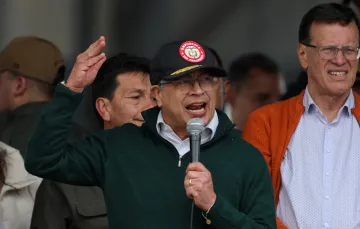Bogota: Colombian President Gustavo Petro on Wednesday said he will break diplomatic relations with Israel over its actions in Gaza, as international pressure rises on the latter to stop its devastating military offensive that has killed some 34,500 Palestinians. Petro has already heavily criticised Israeli PM Benjamin Netanyahu and requested to join South Africa's case accusing Israel of genocide at the International Court of Justice.
"Here in front of you, the government of change, of the president of the republic announces that tomorrow we will break diplomatic relations with the state of Israel ... for having a government, for having a president who is genocidal," Petro told cheering crowds in Bogota who marched to mark International Worker's Day and back Petro's social and economic reforms.
He further said that countries cannot be passive in the face of the events in Gaza. On the other hand, Israeli Foreign Minister Israel Katz accused Petro of being "antisemitic and full of hate". He said Petro's move was a reward to the armed group Hamas, which on October 7 led a deadly attack on Israeli military bases and communities that resulted in the deaths of 1,200 people and over 250 people kidnapped.
Bolivia also broke ties with Israel
Before Columbia, the neighbouring Bolivia announced in October last year that it had broken diplomatic ties with Israel over its attacks on the Gaza Strip, as Columbia and Chile recalled their ambassadors to the Middle Eastern country for consultations. All three countries had slammed Israel for its assault in Gaza and condemned the deaths of Palestinian citizens.
Bolivia "decided to break diplomatic relations with the Israeli state in repudiation and condemnation of the aggressive and disproportionate Israeli military offensive taking place in the Gaza Strip," Deputy Foreign Minister Freddy Mamani said at a press conference at the time. Other Latin American countries, such as Mexico and Brazil, have also called for a ceasefire.
Bolivia cut diplomatic ties with Israel in 2009 under the government of leftist President Evo Morales, also in protest against Israel's actions in Gaza. In 2020, the government of right-wing interim President Jeanine Anez reestablished ties.
Israel's impending attack on Rafah
The United Nations has warned that an Israeli assault in Gaza's Rafah city, where over a million people have taken refuge to escape the devastating military offensive, was on the "immediate horizon" and that the progress by Israel on aid access to the besieged enclave could not be used to justify an operation. This came after Israeli Prime Minister Benjamin Netanyahu vowed to go ahead with a Rafah invasion with or without a ceasefire deal with Hamas.
UN Secretary-General Antonio Guterres appealed for states with influence over Israel "to do everything in their power" to prevent an Israeli assault on Rafah in southern Gaza, where more than 1.2 million displaced Gaza Palestinians are sheltering. "The world has been appealing to the Israeli authorities for weeks to spare Rafah, but a ground operation there is on the immediate horizon. The simplest truth is that a ground operation in Rafah will be nothing short of a tragedy beyond words," said UN aid chief Martin Griffiths in a statement.
US Secretary of State Antony Blinken, who met Israeli Prime Minister Benjamin Netanyahu on Wednesday, said he has still not seen a plan for Israel's planned offensive on the southern Gaza city of Rafah that would protect civilians, repeating that Washington could not support such an assault. The US, Israel's closest ally, opposes the invasion on humanitarian grounds, straining relations between the allies.
Blinken and Netanyahu met in Jerusalem for two-and-a-half hours, after which Israel repeated that the Rafah operation would go ahead despite the U.S. position and a stark UN warning that it would lead to "tragedy". "We cannot, will not support a major military operation in Rafah absent an effective plan to make sure that civilians are not harmed and no, we've not seen such a plan," Blinken told reporters.
(with inputs from agencies)
ALSO READ | Blinken meets Israeli PM, reiterates US can't support Rafah assault without humanitarian plan
Latest World News
